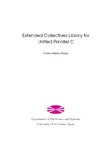Mostrar o rexistro simple do ítem
Extended collectives library for unified parallel C
| dc.contributor.advisor | López Taboada, Guillermo | |
| dc.contributor.advisor | Touriño Domínguez, Juan | |
| dc.contributor.author | Teijeiro Barjas, Carlos | |
| dc.contributor.other | Universidade da Coruña. Departamento de Electrónica e Sistemas | es_ES |
| dc.date.accessioned | 2013-08-16T10:55:46Z | |
| dc.date.available | 2013-08-16T10:55:46Z | |
| dc.date.issued | 2013 | |
| dc.identifier.uri | http://hdl.handle.net/2183/10141 | |
| dc.description.abstract | [Abstract] Current multicore processors mitigate single-core processor problems (e.g., power, memory and instruction-level parallelism walls), but they have raised the programmability wall. In this scenario, the use of a suitable parallel programming model is key to facilitate a paradigm shift from sequential application development while maximizing the productivity of code developers. At this point, the PGAS (Partitioned Global Address Space) paradigm represents a relevant research advance for its application to multicore systems, as its memory model, with a shared memory view while providing private memory for taking advantage of data locality, mimics the memory structure provided by these architectures. Unified Parallel C (UPC), a PGAS-based extension of ANSI C, has been grabbing the attention of developers for the last years. Nevertheless, the focus on improving performance of current UPC compilers/ runtimes has been relegating the goal of providing higher programmability, where the available constructs have not always guaranteed good performance. Therefore, this Thesis focuses on making original contributions to the state of the art of UPC programmability by means of two main tasks: (1) presenting an analytical and empirical study of the features of the language, and (2) providing new functionalities that favor programmability, while not hampering performance. Thus, the main contribution of this Thesis is the development of a library of extended collective functions, which complements and improves the existing UPC standard library with programmable constructs based on efficient algorithms. A UPC MapReduce framework (UPC-MR) has also been implemented to support this highly scalable computing model for UPC applications. Finally, the analysis and development of relevant kernels and applications (e.g., a large parallel particle simulation based on Brownian dynamics) confirm the usability of these libraries, concluding that UPC can provide high performance and scalability, especially for environments with a large number of threads at a competitive development cost. | es_ES |
| dc.language.iso | eng | es_ES |
| dc.rights | Os titulares dos dereitos de propiedade intelectual autorizan a visualización do contido desta tese a través de Internet, así como a súa reproducción, gravación en soporte informático ou impresión para o seu uso privado e/ou con fins de estudo e de investigación. En nengún caso se permite o uso lucrativo deste documento. Estos dereitos afectan tanto ó resumo da tese como o seu contido Los titulares de los derechos de propiedad intelectual autorizan la visualización del contenido de esta tesis a través de Internet, así como su repoducción, grabación en soporte informático o impresión para su uso privado o con fines de investigación. En ningún caso se permite el uso lucrativo de este documento. Estos derechos afectan tanto al resumen de la tesis como a su contenido | es_ES |
| dc.subject | Programación paralela | es_ES |
| dc.title | Extended collectives library for unified parallel C | es_ES |
| dc.type | info:eu-repo/semantics/doctoralThesis | es_ES |
| dc.rights.access | info:eu-repo/semantics/openAccess | es_ES |
Ficheiros no ítem
Este ítem aparece na(s) seguinte(s) colección(s)
-
Teses de doutoramento [2162]






